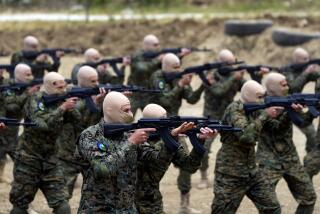Ansar al Islam Seen as Key Threat in Iraq
- Share via
WASHINGTON — An Al Qaeda-linked militant group that was chased from its main base in northern Iraq in the first weeks of the Iraq war has emerged as the key organized terrorist threat to U.S. forces in Iraq, a senior U.S. general said Thursday.
Air Force Lt. Gen. Norton Schwartz, director of operations for the Joint Chiefs of Staff, told reporters that Ansar al Islam, an Islamic extremist organization that U.S. officials have said for weeks is regrouping, is “our principal organized terrorist adversary in Iraq right now.”
Despite the potential danger Ansar represents, it remains unclear whether the group has the sophistication, tactics and manpower to orchestrate a countrywide terrorist campaign. Its northern bases were overrun by U.S. and Kurdish forces in the war.
And Schwartz emphasized that there is not sufficient evidence to conclude that the group was involved in any of the recent attacks on U.S. forces and officials working with them in Iraq.
But the danger is taken seriously. Schwartz said U.S. forces are focusing on breaking up the terrorist organization. He noted that one of Ansar’s highest-ranking members, Aso Hawleri, was captured recently by soldiers of the 101st Airborne Division near the northern Iraqi city of Mosul.
“A lot of [Ansar guerrillas] are in Baghdad,” L. Paul Bremer III, the U.S. civilian administrator in Iraq, told reporters more than a month ago. “If Ansar decides to move, they’ll move big.”
Pentagon officials say the size of Ansar is not clear, but they believe that the group’s influence is spreading.
About 250 of Ansar’s estimated 700 fighters were killed in attacks by U.S. and Kurdish forces in the spring, officials said. Its mountain strongholds were destroyed and its weapons caches, manuals and bombs were seized. Hundreds of its members escaped into Iran or hid along the Iraqi-Iranian border. Its leaders, some of them wounded, vanished.
“There’s no question that countries surrounding Iraq have in some case been certainly abetting the passage of terrorists into Iraq, and Ansar may be one of them,” said Lawrence Di Rita, a spokesman for Defense Secretary Donald H. Rumsfeld.
Schwartz said there was evidence of links between senior Ansar leaders and fugitive Baath Party members loyal to ousted President Saddam Hussein, but added that “generally speaking they are independent actors.”
In a memo to four of his top advisors last week about what he called “a long, hard slog” in fighting global terrorist adversaries, Rumsfeld wrote: “With respect to Ansar al Islam, we are just getting started.” He did not elaborate, and Di Rita declined to answer reporters’ questions Thursday about what Rumsfeld had written.
Whatever the level of coordination in attacks on U.S. troops in Iraq, they remain frequent.
On Thursday, roadside bombs killed an American soldier and two Iraqis in separate incidents north of Baghdad, and a U.S. paratrooper was wounded in a fifth straight day of attacks in a Sunni Muslim city west of the capital, Associated Press reported.
Two other soldiers from the Army’s 4th Infantry Division were wounded in the bombing near Baqubah, about 40 miles northeast of Baghdad, U.S. Central Command said. Pentagon figures put the number of Americans dead in the war at 343, with 205 of them dying since President Bush declared major combat was over May 1.
The two Iraqi guards were killed in a bombing near an oil pipeline 150 miles north of the capital, and 10 more were injured, U.S. officials said
The paratrooper, from the Army’s 82nd Airborne Division, was wounded by a roadside bomb in Fallouja, about 40 miles west of Baghdad, U.S. officials said.
More to Read
Sign up for Essential California
The most important California stories and recommendations in your inbox every morning.
You may occasionally receive promotional content from the Los Angeles Times.













